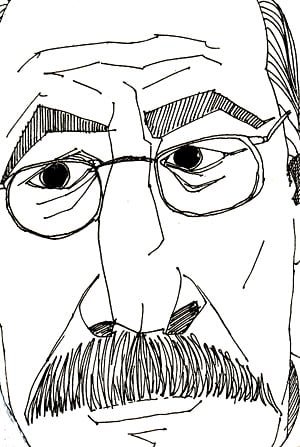
“Finally, in the autumn of 1987” writes W.G. Sebald in The Rings of Saturn, “a hurricane such as no one had ever experienced before passed over the land.” Sebald describes the particulars of that devastation in the penultimate section of his novel, a novel more mutedly but no less fundamentally post-apocaplyptic than Cormac McCarthy’s recent, excellent The Road. The apocalyse in McCarthy’s book is never designated: we fill it in as we like, whether with asteroid, plague, or nuclear nightmare. In Sebald’s novel, the apocalypse is called history, the ruined world only our current own.
Here’s what the narrator sees on the night of 16 October, 1987, as a hurricane that would fell 14,000,000 trees rises from the the Bay of Biscay and bears down on England:
I stood at the window and looked through the glass, which was strained almost to the breaking point, down towards the end of the garden, where the crowns of the large trees in the neighboring bishop’s park were bent and streaming like aquatic plants in a deep current. White clouds raced across in the darkness, and again and again the sky was lit up by a terrible flickering which, I later discovered, was caused by power lines touching each other. At some point I must have turned away for a while. At all events, I still remember that I did not believe my eyes when I looked out again and saw that where the currents of air had shortly beforehand been pouring through the black mass of trees, there was now just the paleness of the empty horizon. It seemed as if someone had pulled a curtain to one side to reveal a formless scene that bordered upon the underworld. And at the very moment that I registered the unaccustomed brightness of the night over the park, I know that everything down there had been destroyed. And yet I hoped that the ghastly emptiness could be explained by some other means, for in the mounting din of the storm I had heard none of the crashing sounds that go with the felling of timber. It was not until later that I realized that the trees, held to the last by their root systems, toppled only gradually, and because they were forced down so slowly their crowns, which were entangled with each other, did not shatter but remained virtually undamaged. In this way, entire tracts of woodland were pressed down flat as if they had been cornfields.
Sebald’s narrative, finely translated by Michael Hulse, progresses not by event and complication but by images. “Bent and streaming like aquatic plants in a deep current” is vivid and strange, the very picture of a world not adrift but at sea. A forrest primeval is “pressed down flat,” suggesting the weight of nothing worse than that of a careless hand. From blackness to blankness: at dawn, the narrator—Dante without a Virgil—leaves his bedroom and sets out on foot to survey ruin. “The ancient trees on either side of the path leading along the edge of the park were all lying on the ground as if in a swoon.” “Swoon:” in its Old English source, gesw?gen, the word means “overcome.” Much of Sebald’s work catalogues such swoonings, living things that—by inattention as much as by malice, by mindless forces as much as by calculating ones—have been muted, undone, overcome.


